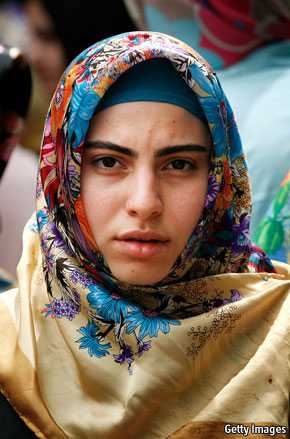Behind the veil
Women’s influence in politics is growing, but it is still small
May 12th 2011 | ISTANBUL | from the print edition
 THIS week in Istanbul 13 European countries signed a Council of Europe convention on combating violence against women. All 47 members were urged to comply. Turkey pushed hard for the convention, which calls for hotlines, shelters and legal aid for abused women.
THIS week in Istanbul 13 European countries signed a Council of Europe convention on combating violence against women. All 47 members were urged to comply. Turkey pushed hard for the convention, which calls for hotlines, shelters and legal aid for abused women.
So it should. Turkey ranks with Russia as one of the worst countries in Europe for abuse of women. By the government’s admission, five women a day were killed by abusers in the first seven months of 2009. A chilling new report from Human Rights Watch, an advocacy group, suggests that the situation is getting worse. It finds that 42% of women over 15 have suffered physical or sexual violence; they are vulnerable even when pregnant. Asli, a 21-year old Kurdish woman, was injected with poison, beaten and raped by her husband and in-laws, and locked in a barn without food or water. She decided to seek help from local prosecutors after her father-in-law burned her arm and declared that “I didn’t just get you here for my son, but also for my pleasure.” But the prosecutors never contacted her, and she now fears for her life. Asli’s story is all too common.
Turkey’s mildly Islamist Justice and Development (AK) party is credited with making unprecedented reforms to protect women since it came to power in 2002. The laws are, however, spottily implemented. Single women, divorcees and wives taken in illegal Islamic marriages are not covered. Police often turn away victims on the grounds that “family unity must be preserved.” Hulya Gulbahar, a feminist lawyer, says that Turkey’s overtly pious prime minister, Recep Tayyip Erdogan, has set the wrong tone. “His diatribes against divorce and calls for women to bear at least three children have made things worse,” she claims. Turkey lags in equality, ranking 126 among 134 countries in the 2010 Global Gender Gap Index. Another study finds that women account for four-fifths of Turkey’s 5.7m illiterate people.
All this should provide fodder for the opposition in the run-up to a general election on June 12th. In fact, the rare talk of women in the campaign is mostly about footage posted on the internet showing candidates from the Nationalist Action Party (MHP) secretly filmed in compromising situations. The good news is that the number of women elected to the 550-seat parliament is expected to double from the current 50 (9%). But Turkey will still be behind other Muslim countries, such as Afghanistan (28%) and the United Arab Emirates (23%).
The best news is that women are getting organised. Those battling to end restrictions on the headscarf are among the most vocal. Secular women support the campaign to force parties to accept female candidates who cover their heads. “No headscarves, no votes,” is their slogan. Although Mr Erdogan and most of his cabinet are married to veiled women, the AK has nominated only one similarly pious woman, for an unwinnable seat. Mr Erdogan’s excuse is that his party was nearly banned in 2008 because of its efforts to lift the headscarf ban. A pro-AK newspaper columnist, Ali Bulac, provoked fury when he suggested that veiled women were “spies” acting for secularists or were exploiting their plight to advance their careers. “You would rather have us stay at home and wash your socks,” riposted Nihal Bengisu Karaca, a (veiled) columnist at the forefront of the campaign. Will she vote for AK anyway? “Absolutely not,” she says.
from the print edition | Europe
via Women in Turkey: Behind the veil | The Economist.

Leave a Reply